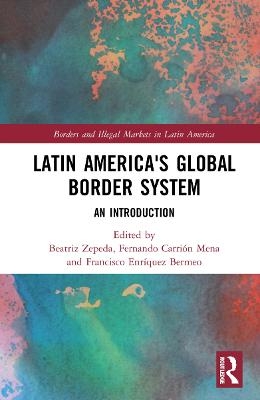
Latin America's Global Border System
Routledge (Verlag)
978-1-032-06881-7 (ISBN)
This volume features expert discussions on border issues of Argentina, Brazil, Bolivia, Ecuador, Guatemala, Italy, Mexico and Peru, as well as studies on illegal markets, cities, and gender as a first step to understanding the intricacies of the global border system of illegal markets and Latin America’s role in it. The book constitutes a valuable source of information on the geographic, economic, demographic, and social characteristics of the most important Latin American border regions, and their relation to global illegal markets, while also offering valuable insights into the ways illegal markets are organized in each country and how they connect across borders to create the global border system.
This book will not only be a valuable resource for academics and students of international relations, security studies, border studies and contemporary Latin America, but will also prove relevant to national and international policy-makers devoted to foreign, security and development policies.
Beatriz Zepeda, is a professor-researcher at the Center for International Studies at El Colegio de México, Mexico. She holds a PhD in Ethnicity and Nationalism and an MSc in International Relations from the London School of Economics and Political Science. From 2012 to 2014 she was director of FLACSO-Guatemala. She has lectured on International Relations at universities in England, Ecuador, Guatemala and Mexico. Her research focuses on the Mexico-Guatemala border, illegal markets, nationalism, migration, and foreign policy. Fernando Carrión Mena, is Emeritus Professor at FLACSO-Ecuador. He has dedicated his life to the study of urbanization process, cultural heritage, violence, security, and drug trafficking. He was director of planning for the Municipality of Quito (1988-1992), general coordinator of RED CIUDADES for Latin America (1990-1993), director of FLACSO-Ecuador (1995-2004) and councilman of the Metropolitan District of Quito (2005-2009). Fernando has founded eight thematic journals, and has published over 250 academic articles, 64 books (as editor or author) and 12 book collections (as coordinator). In 2015 he was recognized by ESGLOBAL as one of the fifty most influential intellectuals of Latin America. Francisco Enríquez Bermeo, Department of Political Studies, FLACSO-Ecuador. Francisco holds a degree in Economics from Universidad Central del Ecuador and a Master’s degree in Local Development from Universidad Complutense de Madrid. From 2015 to 2017, he coordinated the research project "Exploring the political economy of violence in Latin America’s borders". Francisco is currently the Executive Secretary of the Latin American and Caribbean Organization of Border Cities (OLACCIF), a position he has held since 2016.
Introduction: The Permanent Construction of Borders in Latin America Part 1: Border Subsystems 1.1: Producing Countries 1. The Global Border System and Illegal Markets in Peru: Notes for a Research Agenda 2. Bolivia: The Tensions, Challenges and Prospects of the Border Subsystem 1.2: Platform-Type Countries 3. Ecuador’s Global Border Subsystem: From "Island of Peace" to International Crime Platform 4. Borders, Crime, and State Responses in Argentina 1.3: Strategic Countries 5. Guatemala’s Border System: A First Approach 6. Mexico’s Cross-Border Subsystem: Cocaine Trafficking and Violence on the Northern Border 1.4: Multifunctional Countries 7. Projecting Borders across the Atlantic: The Case of Italy from a Latin American Perspective 8. Brazil and Its Borders: History and Limits of a Sovereign State Part 2: Thematic Axes 9. Illegal Markets: New Institutional Architecture and Its Territorial Expression in Latin America 10. Cross-Border Urban Complexes. The Urban Morphology of a Global Structure 11. A Gender Perspective in the Study of Latin American Border Systems
| Erscheinungsdatum | 21.04.2022 |
|---|---|
| Reihe/Serie | Borders and Illegal Markets in Latin America |
| Zusatzinfo | 10 Tables, black and white; 4 Line drawings, black and white; 4 Halftones, black and white; 8 Illustrations, black and white |
| Verlagsort | London |
| Sprache | englisch |
| Maße | 152 x 229 mm |
| Gewicht | 453 g |
| Themenwelt | Naturwissenschaften ► Geowissenschaften ► Geografie / Kartografie |
| Sozialwissenschaften ► Politik / Verwaltung ► Europäische / Internationale Politik | |
| Sozialwissenschaften ► Soziologie ► Spezielle Soziologien | |
| ISBN-10 | 1-032-06881-7 / 1032068817 |
| ISBN-13 | 978-1-032-06881-7 / 9781032068817 |
| Zustand | Neuware |
| Informationen gemäß Produktsicherheitsverordnung (GPSR) | |
| Haben Sie eine Frage zum Produkt? |
aus dem Bereich


